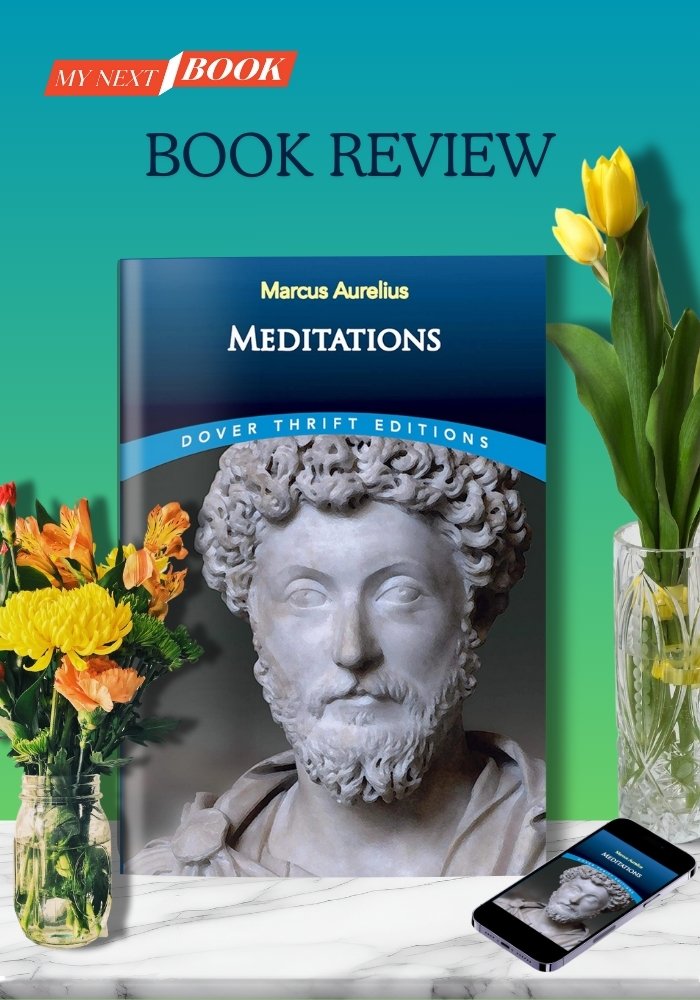Introduction:
Imagine a private audience with a Roman Emperor, Marcus Aurelius, where the conversation turns not to power, but to the profound truths of life. “Meditations” provides a unique, unguarded glimpse into his thoughts, blending personal reflections with stoic wisdom to guide us toward living well. More than just reading, this book invites us on a philosophical journey, probing the essence of a meaningful life.
The Core of “Meditations”: A Summary of Principles
“Within ‘Meditations,’ Marcus Aurelius crafted more than mere thoughts, they’re transformative, timeless guides for self-mastery. Penned for self-guidance and improvement, it’s not an emperor’s rulebook, but a roadmap to personal integrity and wisdom. Aurelius intertwines rationality and reason as tools for embracing life’s impermanence and mastering our inner responses. He illuminates our interconnectedness with all beings and advocates the pursuit of virtue for its inherent value, shaping a stoic narrative of living well.”
Rationality and Reason: The Beacon of Light
Marcus Aurelius championed rational thought, asserting control over one’s mind as pivotal: “You have power over your mind not outside events. Realize this, and you will find strength.” Beyond Philosophy 101, Aurelius’s perspective is vital in today’s emotionally charged environment. By applying his principles, we can navigate daily stressors more effectively, transforming challenges into opportunities for growth. This approach doesn’t just minimize fear, it enhances our appreciation of life and diminishes the dread of death. By integrating Aurelius’s wisdom into our modern lives, we can achieve a balanced and fulfilling existence.
Embracing Life’s Ephemeral Nature
In “Meditations,” Marcus Aurelius delves deeply into the fleeting nature of existence, presenting impermanence not merely as a background theme but as a stark reality. He writes, “All things fade into the storied past, and in a little while are shrouded in oblivion.” This vivid reminder encourages us to reflect on our own transient moments. Rather than merely lamenting this inevitability, Aurelius suggests a proactive embrace of life’s temporary beauty. By understanding that our time is limited, we can prioritize meaningful experiences and relationships, enriching our daily lives. This perspective helps alleviate the burden of trivial stresses and reorients us towards living fully in the present, making the most of each fleeting moment.
Mastery Over One’s Inner Domain
Marcus Aurelius teaches that mastery over our inner world is within our grasp, offering peace amid chaos. “The happiness of your life depends upon the quality of your thoughts.” This principle becomes practical in scenarios like navigating a stressful job. For instance, when overwhelmed with tasks, instead of succumbing to frustration, one could adopt a Stoic approach: focusing on what can be controlled one’s response and mindset rather than external pressures. Cultivating such mental resilience might involve reflective journaling or mindful pauses to assess one’s thoughts, ensuring they align with personal values and goals. This active mental regulation, as suggested by Aurelius, transforms challenges into opportunities for personal growth and stability.
The Symphony of the Universe
The universe is change, our life is what our thoughts make it.” Marcus Aurelius reminds us that change is the only constant, shaping our reality through our perceptions and reactions. This idea serves as a foundation for understanding our profound connection to everything around us. Living in harmony with this ever-changing world involves recognizing our role in the broader context whether environmentally, by promoting sustainability, or socially, through empathetic interactions.
Aurelius likens our collective existence to a cosmic orchestra, with each individual’s actions contributing to a greater melody. To ensure our notes resonate beautifully and not disrupt the symphony, we must align our daily choices with these universal rhythms. This might mean adjusting our attitudes to foster positivity or taking actions that support communal well-being, ensuring that our personal contributions enhance the collective harmony. By understanding and embracing our part in this grand orchestral piece, we tune our lives not only to avoid discord but to actively enrich the overall performance.
The Virtuous Path as Its Own Reward
Marcus Aurelius asserts that virtue should be pursued for its inherent value, not for external rewards. This challenges us to delve deeper into the essence of virtue: integrity, courage, and wisdom. To truly embody these qualities, one must actively practice them in daily interactions be it through honest communication, brave decision-making, or thoughtful responses to everyday challenges.
His directive, “Waste no more time arguing about what a good man should be. Be one,” prompts us to transition from theoretical debates to concrete actions. What does being ‘good’ look like in practice? It involves consistency between one’s values and actions, like choosing truth over convenience or standing by one’s principles even when unpopular. Aurelius’s philosophy invites us to reflect on our actions and aspire to align them more closely with the virtues we esteem, setting a course toward authentic contentment and a purposeful life. This practical application of Stoicism shows that ancient wisdom can guide modern conduct, urging us to live not just thoughtfully but thoughtfully in action.
Reflections: The Mirror of Personal Growth
In “Meditations,” Marcus Aurelius offers not just reflections of his own character but also a blueprint for our personal growth. The book’s focus on personal responsibility, mindfulness, and ethical living acts as a guide for anyone on the path to self-betterment. For instance, Aurelius encourages us to start each day by preparing to meet any challenge with kindness and resilience, a practice that cultivates mindfulness and fortitude in face of daily stresses.
By integrating these principles into our lives, we engage in a deeper examination of our habits and decisions. Aurelius prompts us to consider the impact of our choices, like how opting for honesty in difficult conversations fosters trust and strengthens relationships. These are practical steps toward a virtuous life, demonstrating that the journey of self-improvement is continuous and demands conscious effort.
This reflective process is not just about self-examination, it’s about transforming insights into action. By understanding and applying Aurelius’s wisdom, we move beyond mere contemplation to actual personal evolution, making the lessons of “Meditations” not only timeless but immediately applicable.
Strengths and Limitations: A Balanced View
While “Meditations” offers timeless wisdom, its ancient backdrop can seem distant, exemplified by ideas steeped in Stoic views on fate and virtue that may clash with modern values of individualism and personal freedom. However, this is not merely a barrier but an invitation for deeper engagement. Its introspective nature, while not providing step-by-step guidance, prompts profound self-reflection that modern self-help often overlooks. Readers can bridge these gaps by contextualizing Aurelius’s insights into current challenges, perhaps using modern interpretations or multimedia resources like podcasts that discuss how to apply Stoic principles in contemporary settings.
Applying Ancient Wisdom in Modern Life
The Stoic principles from “Meditations” can be directly applied to modern challenges. For instance, adopting a rational approach allows a professional to navigate office politics calmly, focusing on logical assessments rather than emotional reactions. This can lead to more strategic and effective decision-making. Similarly, embracing impermanence can change our perspective on adversity. Recognizing that stressful periods are temporary can foster resilience and gratitude, reducing anxiety and promoting a balanced response. Additionally, controlling our thoughts through techniques similar to cognitive behavioral therapy helps build a positive mindset, enhancing emotional well-being. Marcus Aurelius’s wisdom, thus, offers not just philosophical insights but practical tools for contemporary life.
Conclusion: A Guide for the Ages
“Meditations” by Marcus Aurelius remains a profound source of guidance, offering insights that address modern dilemmas such as workplace stress and environmental anxiety. For instance, Stoic principles like focusing only on what we can control can help alleviate concerns over global issues by encouraging actionable steps rather than paralyzing worry.
Specifically, Aurelius’s advice helps navigate today’s digital overload. Imagine using his teachings to selectively engage with news that is actionable and relevant, reducing anxiety and increasing effectiveness. This philosophy acts as a practical tool for maintaining mental clarity and decision-making prowess amidst constant digital stimuli.
Aurelius’s work also serves as a philosophical companion that prompts daily reflection and growth, offering passages that readers can apply to everyday decision-making, such as evaluating personal responses to external challenges.
His principle, “The best revenge is to be unlike him who performed the injury,” resonates deeply today, contrasting starkly with the prevalent reactive behavior on social media. Adopting this Stoic response promotes a more thoughtful and measured approach to conflict, leading to healthier personal and community relationships.
By integrating these ancient teachings, we see practical ways to enhance our lives and the broader world, confirming that “Meditations” is indeed a guide for the ages. As you move forward, consider how you might apply a Stoic perspective to one challenging aspect of your life today.






